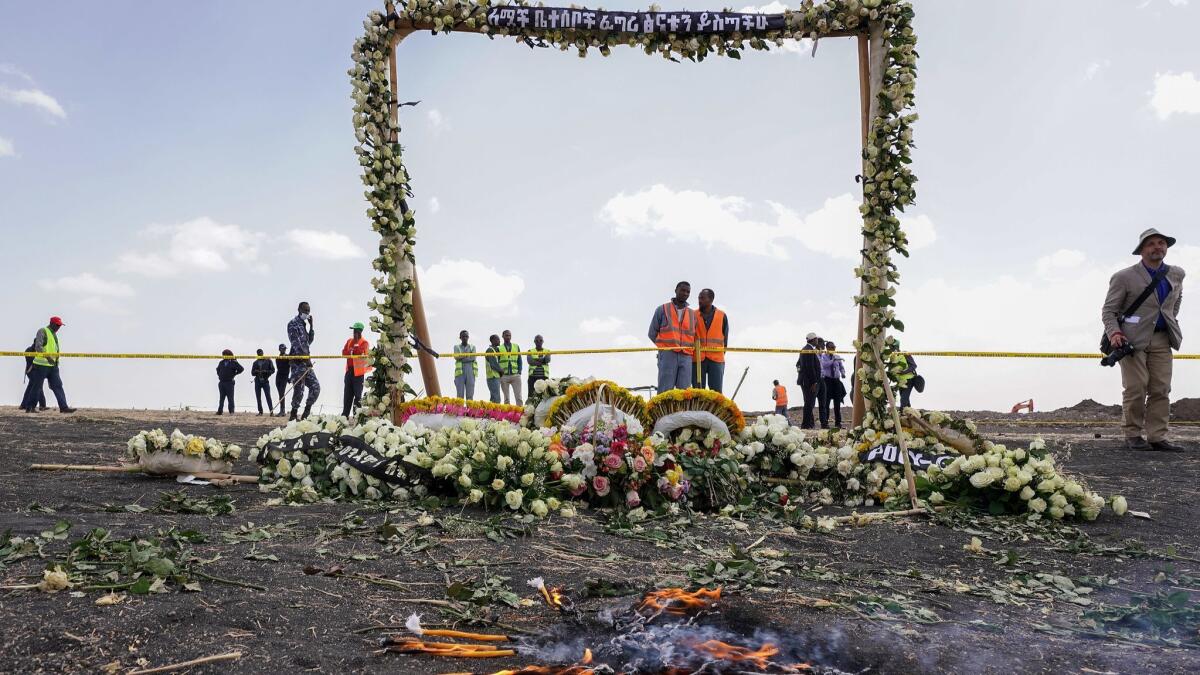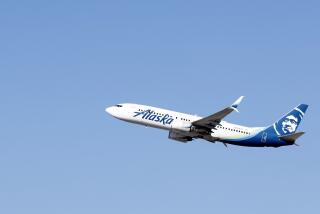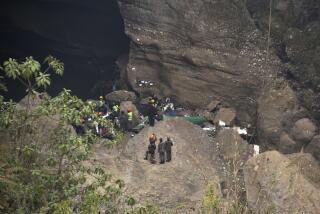Ethiopia snubs FAA, sends ‘black boxes’ from crashed Boeing 737 Max to France

- Share via
Ethiopia has sent the “black box” recording devices from a crashed Boeing 737 Max jet to France for analysis after refusing to hand them over to U.S. authorities, who had kept the Max model flying after most other regulators had grounded it.
The flight data and cockpit voice recorders have arrived at France’s Bureau of Inquiry and Analysis for Civil Aviation Safety, known by its French abbreviation BEA, with coordination meetings underway and technical work set to start Friday. The BEA said it will download data but hasn’t been asked to conduct an analysis.
Ethiopian Airlines, which operated the crashed jet, says the decision to send the devices to a European agency was a strategic one after the U.S. Federal Aviation Administration was left isolated in arguing that the Max should continue flying. The U.S. regulator finally grounded versions of the Max on Wednesday amid mounting concern about similarities between the African tragedy and a crash in Indonesia in October in which a computer system took control of a flight.
Germany’s Federal Bureau of Aircraft Accident Investigation earlier declined to work on the boxes, saying it wasn’t technically possible. France has a direct link to the crash, which killed 157, since the Max’s engines are made by the CFM International venture of General Electric Co. and Paris-based Safran SA.
The choice of the BEA for the decoding of the recorders still represents a snub for U.S. regulators used to taking a leading role in probes of Boeing planes. The U.S. National Transportation Safety Board will still have a role given that the 737 is made in Washington state, and plans to send three investigators to France to help the BEA with the downloading and analysis, according to a statement.
The NTSB also emphasized its own “expertise in recorders, flight crew operations and human factors,” and stressed that the Ethiopian Aircraft Accident Investigations Bureau remains in charge of the probe. The Washington-based agency already has officials in Addis Ababa, Ethiopia, assisted by advisors from the FAA, Boeing and GE/Safran.
The BEA made headlines in 2011 when it took just weeks to recover the full contents of data and voice recorders from an Air France plane at the bottom of the Atlantic Ocean after the devices had spent two years in seawater at a depth of 12,800 feet. The breakthrough helped explain the worst accident in the carrier’s history.
French President Emmanuel Macron has meanwhile held discussions with Ethiopian Prime Minister Abiy Ahmed about a new contract for Airbus SE of Toulouse, France, as part of a renewal of the Ethiopian Airlines fleet, a French official said Thursday.
Though the African carrier already operates the European plane maker’s A350 wide-body, all of its other jets are Boeings, including 787 Dreamliners for which it was one of the first global customers, and a variety of 737s.
Macron will also discuss a major Airbus order during his Chinese counterpart Xi Jinping’s state visit to France later this month, the official said. China has 20% of all delivered Max jets and was the first major authority to ground the model after Sunday’s tragedy.
The Asian nation will itself be looking to benefit from the 737’s travails by attracting more sales for the Comac C919, which the company says has more than 800 orders worldwide.
Boeing’s $600-billion-plus backlog for the 737 Max is also looking shaky after several big customers reconsidered their purchases, among them VietJet Aviation JSC, which doubled its order to about $25 billion last month, and Lion Air, operator of the plane in the Indonesia crash, which plans to drop a $22-billion deal, according to a person with knowledge of the plan.
Indonesia will send two officials to Addis Ababa as observers of the crash investigation, and will share data and insights from its own probe into the loss of Lion Air flight 610 in October, according to Soerjanto Tjahjono, chairman of the country’s National Transportation Safety Committee.
The Lion Air 737 experienced more than two dozen sharp dips shortly after takeoff, with a preliminary report suggesting the jet was automatically commanded to dive because software thought it was in danger of losing lift following a sensor malfunction.
A rift opened between Lion Air and Boeing when the U.S. company said the disaster could have been avoided if pilots had followed procedure, though it has since cooperated positively with Indonesia in the probe, according to Tjahjono, who said Indonesia’s aviation investigators haven’t received any reports of further malfunctions concerning the Max.
The British Air Accidents Investigation Branch, which has sent three experts to the Ethiopia crash, as British citizens were among those killed, said that whichever body processes the boxes, the airline and other relevant parties would attend as observers to ensure that proper protocols are followed.
More to Read
Inside the business of entertainment
The Wide Shot brings you news, analysis and insights on everything from streaming wars to production — and what it all means for the future.
You may occasionally receive promotional content from the Los Angeles Times.










